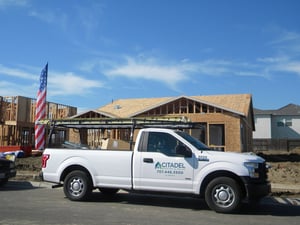If you own, operate or manage a home construction company in California, whether custom or production, your business is affected by a new mandate that all homes built in the state must include solar energy systems. The mandate goes into effect on New Year’s Day 2020 and impacts virtually all of the 80,000+ new homes expected to be built in California that year. It applies to single-family homes plus multifamily buildings under three stories, including condos and apartment buildings.
 The addition of solar to your business model should be approached carefully—and rapidly, if you haven’t already started your planning.
The addition of solar to your business model should be approached carefully—and rapidly, if you haven’t already started your planning.
Based on our team's 16 years of experience helping contractors integrate solar into their new home construction projects, Citadel Roofing & Solar offers this list of the top 10 things homebuilders need to know to comply with the new solar requirement. The list also includes steps you can take to convert the mandate into more business for your company.
-
Don’t underestimate the impact on your construction schedule and process. Adding solar energy systems to your homes is not as simple as, for example, switching to a high-end cabinet maker. The solar contractor must coordinate with other contractors, in particular HVAC and plumbing contractors to ensure they don’t run their vents and pipes through the roof sections where the solar panels are to be installed. And your solar crew must understand how to complete its job without damaging the roof. Far too many home construction projects are delayed when roofers have to be called back to fix tiles or shingles cracked or broken by inexperienced solar companies.
-
Be cautious of the cheapest bid. “The bitterness of poor quality remains long after the sweetness of low price is forgotten.” Like other building products, solar panels come in good, better and best. Some produce more power per square foot, which can be ideal for smaller roofs. Solar companies range from fly-by-night carpetbaggers to experienced, reputable ones with staff and methods that exceed the required licenses and quality controls. Don’t go for the cheapest equipment and the lowest-cost bidder as you’ll likely pay later, with system repairs and re-installations, equipment upgrades, and unhappy customers.
-
Don’t forget service and warranties. You don’t want to become the Customer Service department for your buyers’ solar questions. Your agreement with your solar partner should include a service component as well as warranties that provide you and your customers with peace of mind.
-
Know your financing options. When it comes to paying the solar company, home construction companies have two choices. You can buy the systems outright and recover the cost through the home sale price. Or you can have the solar installer set up leases or Power Purchase Agreements (PPAs) directly with homebuyers, which doesn’t impact your books. With a lease or a PPA, homeowners make monthly payments to a third party (which owns the solar system) for the solar electricity produced on their roof, at a rate lower than the utility’s rate. If they need more electricity than they produce, the utility provides the extra through the grid and bills the homeowner accordingly.
-
Understand the impact of the interconnection process on your business. We know how irritating it is when an irate customer points the finger at the general contractor for a subcontractor’s work. With solar on new homes, a common complaint comes when the system is not yet “interconnected” and turned on when the new owner moves in. Good solar construction partners have strong relationships with the utilities and know how to get the approval to interconnect (also called Permission-to-Operate, or PTO) in a timely manner.
-
Consider going above the minimum requirements. The state is mandating minimum system sizes based on the new home’s square footage and regional climate. But you might be surprised at how many consumers actually prefer to pay for larger systems. In a recent new home development project for which Citadel Roofing & Solar was the solar provider, 60% of the homebuyers opted for additional panels when given the choice.
-
Add-ons are an opportunity. You can add value to your homes, and appeal to the many homebuyers willing to invest in green features, by adding on products like electric vehicle chargers and solar energy storage systems. In particular, these amenities make sense for higher-end homes. Energy storage systems are increasingly popular in light of the recent spate of planned utility power outages as a wildfire protection method.

-
One-stop shopping will make your life easier. A handful of companies have offered both roofing and solar services for some years, to homeowners but also homebuilders. Citadel works with scores of homebuilders of all sizes throughout the state of California. When we install both the roof and the solar, it erases any concern about the roofers damaging the solar equipment or the solar installers damaging the roof, thereby giving you better results plus one less sub to manage.
-
Consider the crews. Some companies that claim to offer both roofing and solar installations actually outsource one or even both jobs. Builders know better than most that using your own, known crews helps control quality. Citadel uses our own local, trained, certified and experienced crews for all our installations.
-
Choose your solar partner with caution. Finally, as you were probably expecting, we advise care when choosing which solar company to bring on board as part of your team. The right partner will integrate into your operations seamlessly and will possess all the experience and expertise to make the addition of solar a painless proposition. Your partner should have strong knowledge of California building code, in particular the Title 24 Building Energy Efficiency Standards section. The best solar companies offer their homebuilders financial guidance, design and construction advice, and post-purchase service and support for your customers. They’ll even train your Sales team on solar, or supplement your in-house reps.
The solar mandate may feel like a huge headache to you right now. But the majority of consumers support energy efficiency and renewable energy. By providing solar as part of your new homes, you offer an enticing product to homeowners who want solar but haven’t found the time or energy (pardon the pun) to pursue it yet.
And while California is the first state to implement a mandate like this, it won’t be the last. States around the country are looking to renewable energy to help meet their climate change targets. If you work in multiple states, consider California a pilot program that can be expanded into other parts of the country, helping your business grow.



